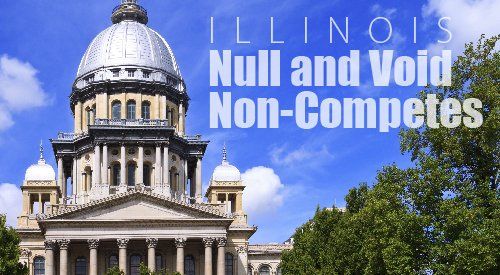Null and Void Non-Competes: Illinois Placing Substantial Limitations on Non-Compete/Non-Solicitation Agreements

On May 31, 2021, the Illinois legislature passed Senate Bill 672. The bill was officially signed by Governor Pritzker on August 13, 2021 and will amend the Illinois Freedom to Work Act, which governs non-compete and non-solicitation agreements. Although the changes will not take effect until January 1, 2022, employers should be aware of their implications.
The most notable reform is that non-compete agreements with employees who earn or are expected to earn less than $75,000 per year will be invalid. This amount will increase by $5,000 every five years.
Similarly, courts will no longer enforce non-solicitation agreements with employees who earn or are expected to earn less than $45,000 per year (with such amount increasing by $2,500 every five years).
Non-compete agreements will be prohibited altogether with respect to most public employees and construction workers.
Another key provision is related to employees who have been affected by the COVID-19 pandemic. Employers will not be able to enter into non-compete/non-solicitation agreements with any employee who was terminated, furloughed, or laid off as a result of business circumstances or governmental orders related to the pandemic, unless the employee receives his or her base salary through the non-compete/non-solicitation period (subject to the employee being hired elsewhere).
In addition to the above restrictions, for non-compete/non-solicitation provisions to be enforceable, they must be no more restrictive than what is required to protect the employer’s legitimate business interest, must not impose an undue hardship on the employee, and must be supported by adequate consideration. An employee will be considered to have received adequate consideration where he or she works for the employer for at least 2 years after signing the agreement or the employer provides the employee with professional or financial benefits in addition to his or her normal compensation and benefits.
Employers will also be required to advise employees, in writing, to consult with an attorney before entering into non-compete/non-solicitation agreements, and to give employees at least 14 days to review agreements before signing them.
Employers with questions about how this new law will affect their non-compete/non-solicitation agreements, and employees who need assistance in evaluating their own non-compete/non-solicitation agreements, should call our office at 847-705-7555 and ask to speak to an attorney.
More News & Resources
Lavelle Law News and Events












